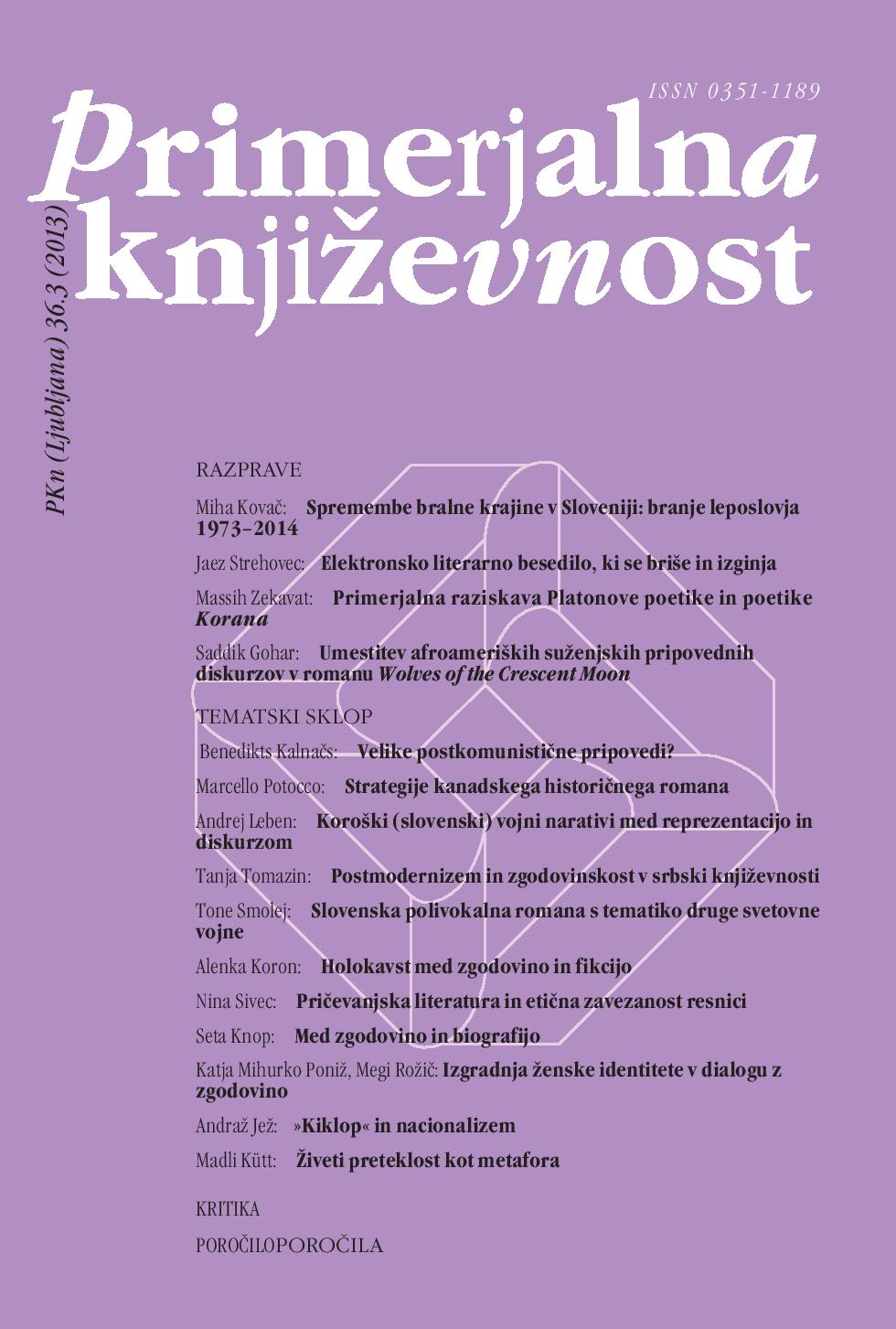“Cyclops” and Nationalism: Inherent Political Dilemma of Joyce’s “Hybrid” Text
Keywords:
English literature, Joyce, James, nationalism, imperialism, Ireland, postcolonial studiesAbstract
The paper focuses on the dilemmas presented in James Joyce’s “Cyclops” episode, a chapter of his opus magnum, Ulysses. Beginning briefly by outlining the parallels with Homer’s Odyssey as the source text of Joyce’s intertextuality helps us understand elementary discrepancies in ideological agendas and the basic relations between the protagonists. In this regard some subtle distinctions between imperialism and colonialism, as proposed by Ania Loomba in Colonialism/Postcolonialism, are introduced. The dichotomy between the chapter’s seemingly easily comprehensible relations and a polyphony of voices that constantly interrupts them has been discussed at greater length in several current postcolonial studies. The postcolonial attitude opens pertinent questions but leaves aside certain points that were no doubt essential to Joyce. Most of those studies – some of them are mentioned in the text – simply ascribe currently popular notions of postmodern plurality to Joyce’s mode of writing. Without completely dismissing the views mentioned, the paper considers Joyce rather an unlikely forerunner of another approach – the one suggested by Slavoj Žižek in his reflections on a postcolonial thought. His criticism directed at the traditional line of thought still inherent to many postcolonial theorists (if not to postcolonial studies in general), when applied to the topic, creates a more credible explanation of many of Joyce’s personal and literary decisions. – The article argues that Joyce was well aware of political dilemmas; by recalling some biographical notes and excerpts from his non-literary writing, the discussion emphasizes the often overlooked bonds between his political statements and the structure of the “Cyclops” episode. Without the framework put forward by Žižek, both – Joyce’s literature and his biographical persona – could indeed be understood as merely ambiguous towards its underlying political questions and encouraging arbitrary interpretations, those seemingly beyond a clear political agenda.References
Altshuler, David A. Hitler’s War Against the Jews: A Young Reader’s Version of the War Against the Jews, 1933–1945, by Lucy S. Dawidowicz. New York: Behrman House, 1978.
Brenner, Michael, Rainer Liedtke in David Rechter. Two Nations: British and German Jews in Comparative Perspective. Tübingen: Mohr Siebeck, 1999.
Campbell, Joseph. Mythic Worlds, Modern Words. On the Art of James Joyce. Novato: New World Library, 2003.
Campbell, Matthew. »Nineteenth-Century Lyric Nationalism«. James Joyce in Context. Ur. John McCourt. Cambridge: Cambridge University Press, 2009. 184–194.
Castle, Gregory. »Post-Colonialism«. James Joyce in Context. Ur. John McCourt. Cambridge: Cambridge University Press, 2009. 99–111.
Childs, Peter in Patrick Williams. Introduction to Post-Colonial Theory. London, New York: Routledge, 2014.
Dokler, Anton. Grško-slovenski slovar [Elektronski vir]. (Popravki Matej Hriberšek et al.). Ljubljana: Inštitut za slovenski jezik Frana Ramovša ZRC SAZU, 2015.
Eliash, Shulamit. The Harp and the Shield of David: Ireland, Zionism and the State of Israel. Abingdon: Routledge, 2007.
Ellmann, Richard. James Joyce – New and Revisited Edition. Oxford, Toronto, New York, Melbourne: Oxford University Press, 1982.
Frankel, Jonathan. Prophecy and Politics: Socialism, Nationalism, and the Russian Jews, 1862–1917. Cambridge: Cambridge University Press, 1984.
Gradišnik, Janez. »Pisatelj in njegovo delo«. James Joyce: Ulikses II. Ljubljana: Državna založba Slovenije, 1967. 387–629.
Graham, Colin. Deconstructing Ireland: Identity, Theory, Culture. Edinburg: Edinburgh University Press, 2001.
Harlamov, Aljoša. »Nezanesljivi pripovedovalec v sodobnem slovenskem romanu«. Jezik in slovstvo 55.1–2 (2010): 33–46.
Hobsbawm, Eric. Obdobje revolucije. Prevod: Mirko Avsenak. Ljubljana: DZS, 1968.
Hutton, Clare. »The Irish Revival«. James Joyce in Context. Ur. John McCourt. Cambridge: Cambridge University Press, 2009. 195–204.
Joyce, James. Selected Letters. Ur. Richard Ellmann. New York: Viking Press, 1975.
– – –. Ulikses I. (Prev. Janez Gradišnik). Ljubljana: Državna založba Slovenije, 1967.
– – –. Umetnikov mladostni portret. (Prev. Jože Udovič). Ljubljana: Cankarjeva založba, 1966. (Zbirka Sto romanov 20.)
Leerssen, Joep. National Thought in Europe: A Cultural History. Amsterdam: Amsterdam University Press, 2008.
Lernout, Geert. »Religion«. James Joyce in Context. Ur. John McCourt. Cambridge: Cambridge University Press, 2009. 332–342.
Loomba, Ania. Colonialism/Postcolonialism. London, New York: Routledge, 2005.
Lukács, György. O današnjem pomenu kritičnega realizma. (Prev. T[aras] K[ermauner]). Ljubljana: Cankarjeva založba, 1961.
Litz, A. Walton. James Joyce – Method and Design in Ulysses and Finnegans Wake. London, New York, Toronto: Oxford University Press, 1962.
Newman, Gerald G. The Rise of English Nationalism: A Cultural History, 1740–1830. New York: St. Martin’s Press, 1987.
Weinberg, Sonja. Pogroms and Riots: German Press Responses to Anti-Jewish Violence in Germany and Russia (1881–1882). Frankfurt ob Majni: Peter Lang, 2010.
Žižek, Slavoj. »Beckettov ne-Jaz«. Poskusiti znova – spodleteti bolje. Ljubljana: Cankarjeva založba, 2011. 323–343. (Zbirka Čas misli.)
Žižek, Slavoj, Gary A. Olsen in Lynn Worsham. »Philosopher, Cultural Critic and Cyber-Communist«. JAC Online 21.2 (2001): 251–286.
Perseus Digital Library. Ὀδύσσεια. Splet 19. 10. 2015. http://www.perseus.tufts.edu/hopper/, http://www.perseus.tufts.edu/hopper/text?doc=Perseus:text:1999.01.0135, http://www.perseus.tufts.edu/hopper/text?doc=Perseus%3Atext%3A1999.04.0058%3Aentry%3Dpolu%2Ffatos, http://www.perseus.tufts.edu/hopper/morph?l=polu%2Ftropon&la=greek&can=polu%2Ftropon0&prior=mou=sa&d=Perseus:text:1999.01.0135:book=1:card=1&i=1#lexicon.


